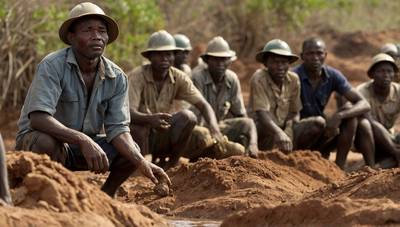Mozambique’s illegal miners make money but the land suffers
Illegal miners are flocking to Mozambique to mine gold in Manica
Miners say they are not protected but that the risks are worth it
Farmers say mining activities pollute rivers, soil and water.
By Samuel Come
The risks may be high, but for barefoot miners in Mozambique’s Manica Province, they are well worth it.
Manica, which borders Zimbabwe on the west, is a magnet for men desperate to find gold or precious stones. They use picks and shovels to dig. Fernando Massada is one of hundreds of men who are mining in the Mucurumadze area.
Garimpeiros are miners from southern Africa, including Mozambicans and Zimbabweans.
Massada claimed that he had once extracted 270 g of gold in a single working day. He used the money to renovate and purchase a motorbike.
He said, "That's the reason it's hard for us to leave."
Such dreams are not without their dangers. Mercury has seeped through the soil and into the rivers near the mines, creating a nightmare situation for farmers.
According to the National Statistics Institute's (INE) 2021 figures, Mozambique is home to about 230,000 artisanal miners. Manica Province, on the other hand, has 338 small-scale sites of which 288 active.
According to the World Bank, about 10,000,000 people live in rural areas of sub-Saharan Africa and are involved in artisanal mines.
According to a report released by the World Gold Council last year, illicit gold trade from artisanal mines was fueling conflicts in Ukraine and Sudan as well as funding terrorism.
The men in Mucurumadze are a vital part of one of the poorest countries in the world, even though the rewards may be difficult to predict.
"It all depends on luck," said Zimbabwean Simon Chibata who has lived in Mozambique for the past five years and is a miner.
He lives 60km (37miles) from Mucurumadze, and spends up to a week in the mines.
Many choose to sell gold to buyers on the spot, even though prices are lower in Manica Town (about 10 km away). They are afraid of being stopped by the authorities in town.
Gold is sold at $69 per kilogram in the mines. In Manica Town, it costs about $116.
Chibata said that he had seven children and said, "Sometimes you can make enough money the day after you arrive to return home."
TOXIC TREATMENT
In the late 1980s, artisanal mining boomed in Mozambique with the closures of large-scale production sites including gold mines. Farmers and migrant laborers joined those who were illegally prospecting for gold.
Last year, the then Minister of Mineral Resources and Energy Carlos Zacarias said: "We must admit that many Mozambicans engage (illegally) in mining as a way of life, without adhering to the safety and environmental regulations that are generally required."
At least three gold miner were killed when a Manica mine collapsed in June.
According to the World Health Organization, mercury is one of the 10 most dangerous chemicals for public health.
Illegal miners burn toxic mercury off to extract gold from sand, rock, and soil. The vapor is then absorbed by the plants, soil, and rivers.
Mercury is known to cause birth defects and damage to the nervous system, kidneys and liver.
According to the United Nations, mercury emissions from small-scale and artisanal gold mining can account for as much as 40% of global mercury emission.
Researchers at Mozambique’s Pungue University in 2022 found that the constant burning of mercury has increased soil concentrations of mercury.
Mining in Mucurumadze polluted Revue, Nhancuarara, and Mucurumadze Rivers, which has affected the communities that live along their banks. Mining activities in the area have also deposited silt into the water.
The Revue provides water to the Chicamba Hydroelectric dam, the water treatment plant in the region and the communities.
Rui Silva is an environmentalist who has studied the effects of mining in other rivers throughout Mozambique. He said that illegal mining causes deforestation and contamination of soil, river, and water.
Silva stated that "this is a serious issue because these activities are polluting river ecosystems and affecting the health of those who do not mine."
Marta Arminda, who lives about 10 kilometers (6 miles) away from the mine site, used to be able to grow vegetables with river water. She says that she is no longer able.
The water was dirty and muddy. The mother of five said that even if she watered onions or lettuce, the soil would dry up because there was too much sediment in the water.
She sells food at the mine site.
She said, "I can't sit around and do nothing. It's not as lucrative as growing vegetables."
Sibiao Kunai is the head of the Chicamba Dam Fishery Community Council. He said that about 500 fishermen had abandoned their profession due to pollution on the Revue River and Chicamba River, which has caused the fish population to decrease.
The Ministry of Health and the Ministry of Mineral Resources and Energy of Mozambique did not respond to our requests for comment.
Silva believes that the only way to mitigate the problem is by increasing awareness among the miners of the negative effects.
It is difficult to imagine an alternative for someone like Tembo Mcanha, a Malawian, who has mined in Manica for almost a decade.
In 2019, he returned to Malawi, but the Covid pandemic that ravaged his home country, which is also among the poorest in the world, forced him to return across the border to Mozambique.
(source: Reuters)





